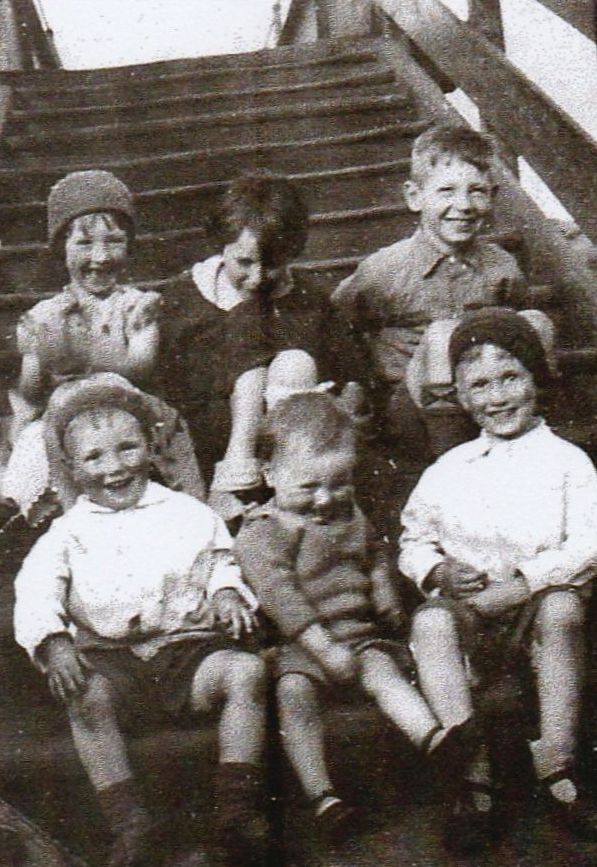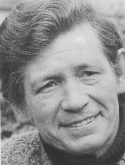Hill was born in 1927, to a working class family in the area of Stourbridge in the Black Country. Much of what we know of Hill’s life comes from his writings, especially his first book, the autobiographical A Cage of Shadows. This book covered Hill’s life up to the early 1950’s. Quite extraordinarily, the original text included material about Hill’s mother which she considered defamatory. She successfully sued for libel and the book was reissued with an apology from Hill and most references to his mother omitted.
It sets out, in unsparing detail, the family problems caused by his father’s abusive behaviour as well as Hill’s own difficulties in early life. It includes unsentimental descriptions of the nature of working-class Black Country existence during the depression, including an account of a rat killing contest and portraits of his adult friends who he names Konk and Pope Tolley.

This photo above is of the family he grew up in – Hill is on the right top. The atmosphere of this picture is definitely cheerful, perhaps be-lying some of his more extreme claims about the misery he endured.
Hill left the Black Country in 1944 to join the services, never to reside there again. The book deals with this period too. It includes a harsh account of his post-army experiences in a mental hospital, in prison and sleeping rough in London, before ending on a more optimistic note as he finds a new resolve to live a more settled life.
Eventually, he settled in Hertford and became a jobbing writer, doing journalism, radio and TV scripts, including some Z Cars episodes.It was however, the publication of a Cage of Shadows that became a life-changing event. This established him as a writer of stature and he came forward with a steady flow of books over the next ten years. Four works of fiction were published, along with four further memoirs. Summer’s End in 1976 grew out of the filming for Archie Hill Comes Home and, like A Cage of Shadows, the book provides autobiographical stories from Hill’s youth, though now told with a mellower and more humorous tone as he realises that, notwithstanding the poverty of the depression, there were still ‘some golden chapters of childhood; that not all my memories were dark and bleak’. Closed World of Love is about Hill’s disabled step-son Barry, who lived a severely restricted life, being entirely wheelchair bound and unable to speak. Hill tenderly describes how he is able to learn from his stepson by imaginatively putting himself in his place.

The Second Meadow in 1982 recounts the three months he spent living off the land on a remote country estate, making use of his poaching skills to kill animals for food. The title refers to his observation that only brave animals venture to the meadows far from the safety of the woods. This period was Hill’s life was intensively productive. He also became a regular broadcaster, his books often being accompanied by radio or TV programmes.
Of particular note is his four-part BBC TV series about the Black Country, Archie Hill Comes Home. This is what Hill himself said of it:
After 20 years of absence from my birthplace, I wanted to go back. So when Derek Smith, a TV producer from BBC Birmingham sought me out, I didn’t need much encouragement to pack a suitcase and go home. We spent several weeks making the series of films and sometimes, we had to dig a bit on the deep side to find the real Black Country. But we dug well and found little pieces tucked away, little roots and tendrils of it. Probably men of my generation are the last of the fully Black Country Race, the last echo of it. We can span back through our fathers and grandfathers’ memories and when we are dead, there is an end to it.
In my view it is quite outstanding, as good a programme about a region of England as you are likely to see.
One aspect of his life at this time at this time was a desire to help people who were afflicted with addiction. A leaflet he produced publicises one of his initiatives – offering talks to try to help alcoholics and drug addicts to get back to a better path through life. This shows a man with a sensitive social conscience and a deep-seated commitment to live a valuable life. Sadly, though, it was not enough.
Set against the generous aspects of his nature was a deep-seated self-destructive tendency which caused him to destroy everything that had brought him success and self-esteem. This came through strongly in his final book which was sub-titled ‘The Story of an Alcoholic’. Published in 1984, from it w learn that Hill is back on the bottle, his marriage has broken down and his is living in a caravan in some woods near Hertford. It revisits his life story as set out in a Cage of Shadows from the perspective of an incurable addict. It is an accomplished, even brilliant piece of writing, but deeply sad.
Two years later, he was dead, having taken his own life by carbon monoxide poisoning. Here are a couple of quotes which sum something his life and abilities:
Black Country writer Michael Pearson said he was:
“…hugely talented … very rough Black Country with a lived-in face. An alcoholic with suicidal tendencies, he was said to be programmed to self-destruct, but often had a smile on his face and a twinkle in his eye.”
Literary critic Paul Lester said that
Archie Hill’s books still bear testimony to an unsanitised heritage from which this curious, wayward, tormented, individual could never, in his lifetime, escape the painful consequences.

